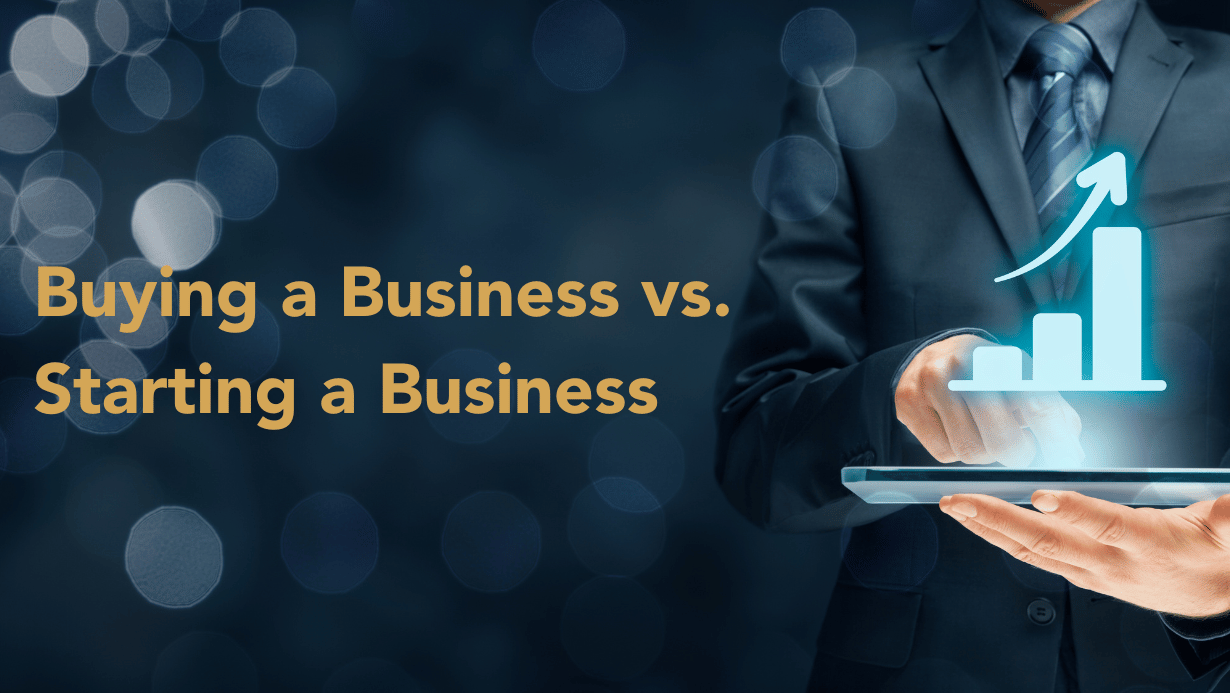Ready to Embark on an Exciting Journey with WIN?
Take the first step toward personal and financial freedom by filling out the interest form. One of our franchise advocates will be in touch with you soon!

Warren Buffett once said, “Risk comes from not knowing what you’re doing.” Therefore, understanding the intricacies of both buying an existing business and starting from scratch is crucial in minimizing risk and maximizing success. Together, we’ll explore these two paths to business ownership, and by the end, we hope to have equipped you with the knowledge you need to make the decision that’s right for you.

Buying a business presents an unparalleled opportunity to step into the entrepreneurial arena with a running start. This path allows you to harness the legacy of an existing establishment, capitalizing on its established customer base, operational processes, and market presence. Yet, it demands meticulous due diligence, a keen eye for potential, and the courage to navigate the complexities of financial analysis, legal considerations, and strategic planning. This venture is not just an investment in a business, but a profound investment in your entrepreneurial dream.
Understanding the true value of a business is crucial. This involves analyzing financial statements, evaluating assets and liabilities, and considering the business’s growth potential. A thorough assessment will help you determine if the business is a sound investment and if the asking price is justified.
The due diligence process is a comprehensive evaluation of the business’s operational, financial, legal, and strategic position. It is designed to uncover any potential risks or liabilities that could affect the value of the business or its future performance. Skipping this step can lead to unpleasant surprises down the line.
Financing the acquisition of a business can be complex and requires careful planning. Options include traditional bank loans, seller financing, or investment from venture capitalists or angel investors. Understanding the financing landscape and choosing the right option for your situation is a critical step in the purchase process.

Starting a new business epitomizes the essence of entrepreneurship, offering a blank canvas as vast as your ambition. This path is paved with the freedom to innovate, create, and shape an enterprise precisely in your vision. While this journey can be fraught with challenges, these hurdles serve as catalysts for growth, pushing you to develop resilience, adaptability, and a deep understanding of your market. Starting a business from the ground up is not merely about launching a new product or service, but about bringing a dream to life.
Comprehensive market research is foundational to starting a new business. It helps in understanding the target market, identifying customer needs, analyzing competitors, and spotting trends. This information is crucial for making informed decisions and positioning your business for success.
Crafting a detailed business plan is essential for clarity and direction. It outlines your business idea, strategy, marketing plan, financial projections, and operational structure. A well-developed business plan is also vital for securing funding, as it demonstrates the viability of your business to potential investors or lenders.
Initial funding is critical to get your business off the ground. Options include personal savings, loans from family and friends, bank loans, venture capital, or crowdfunding. Alongside financial resources, securing the right human resources and technological tools is also crucial for operational success.

Deciding whether to buy an existing business or start a new one is a big decision that ultimately is controlled by various personal, financial, and market-related factors. This section explores the other crucial aspects you should consider when making this decision to ensure that your new business not only aligns with your entrepreneurial aspirations, but also fits your personal life and financial goals.
When determining which opportunity is right for you, there’s a couple of key things to consider. A self-assessment will help you understand where you’re at and where you want to be, so you can align your skillset, personal and professional goals, and entrepreneurial aspirations with the right business opportunity.
You should consider buying an existing business if you…
You should consider starting a business if you…
Research current market trends and potential opportunities in the industry you’re interested in. Whether you’re starting a new business or buying an existing one, understanding the market landscape is crucial for identifying growth opportunities.
Also, develop detailed financial plans and projections for each scenario. Starting a new business might require less initial capital but a longer period to reach profitability. Conversely, buying a business requires a significant upfront investment but might offer immediate cash flow. Your financial planning should include potential funding sources, operational costs, and revenue projections.
It’s important to reflect on the impact each business style will have on your personal life. Starting a new business might demand a substantial time investment upfront, potentially affecting your personal time and relationships. On the other hand, buying an existing business might also require considerable commitment but could offer a more predictable schedule over time.
Consider the level of commitment and involvement each path requires. Starting a new business demands involvement in every aspect of the business, from concept to execution, whereas buying an existing business might allow you to focus more on management and growth, relying on established processes and team members to help you run the day-to-day.
Pro Tip: For those leaning towards purchasing a business but wary of the challenges of taking over an existing independent business, buying a franchise might be an ideal compromise. Franchises offer the advantage of operating under an established brand with a proven business model, while still providing the opportunity to run your own business. This option combines elements of both starting fresh and buying into established systems, potentially offering a balanced approach to business ownership for certain entrepreneurs.

Whether you’ve decided to buy an existing business or start a new one, there are specific steps you’ll need to take to turn your entrepreneurial dreams into reality.
Before closing the deal, conduct a final review of all due diligence documents and ensure all your concerns are addressed. You’ll also want to ensure our financing is in place. This could involve finalizing loans, investor contributions, or personal funds. Work with a lawyer to draft and review all purchase agreements, ensuring they accurately reflect the terms of the deal, including price, assets, liabilities, and any conditions precedent to closing. Finally, attend the closing, where you’ll sign the necessary documents, transfer funds, and officially take ownership of the business.
Work with the previous owner to create a transition plan. This plan should detail how the change in ownership will be communicated to employees, customers, and suppliers, and outline any training or support you’ll receive. This step is crucial to retain relationships with employees, external partners, and customers. You’ll want to gradually take over the day-to-day operations of the business, implementing the transition plan and making any necessary adjustments to ensure a smooth handover. Abruptly taking over can cause stress and tension for all those involved, including customers! Once you’ve officially taken over, assess all areas of the business for potential improvements. Begin to implement changes slowly, respecting the existing culture and relationships while steering the business towards your vision.
You’ll first need to decide on the legal structure of your business (e.g., sole proprietorship, partnership, LLC, corporation), which will impact your taxes, liability, and business registration requirements. Then, register your business name and structure with the appropriate government bodies and obtain any necessary licenses and permits required to operate legally in your industry and location. Finally, open a business bank account, set up accounting systems, and plan your business budget.
Before launching, finalize the development of your products or services and ensure they are ready for market, meeting the unique needs of your target customers. You’ll also need to create branding materials, such as a logo, business cards, and a website, as this is critical for building a reputation and name ID with customers. Plan and execute a launch strategy to introduce your business to the market. This could include social media campaigns, opening events, promotional offers, and outreach to press and influencers in your industry. After launching, actively seek customer feedback and be prepared to adjust your products, services, or marketing strategies based on this feedback.
Each route offers its own set of rewards and challenges, but the key is to choose the one that resonates most deeply with your entrepreneurial spirit and life goals. As you consider your options, it’s worth exploring opportunities in resilient and growing industries. One promising avenue is buying or starting a home inspection business, an essential part of the real estate market that thrives regardless of economic cycles. Within this industry, WIN Home Inspection stands out. Ranked #1 in 2023 and 2024 and recognized as the fastest-growing home inspection franchise in the United States, WIN Home Inspection offers an unparalleled business opportunity for aspiring entrepreneurs.
WIN Home Inspection is an attractive option for those considering purchasing a business or starting from scratch. With in-house training and certifications for over 35 essential services, WIN equips franchisees with the knowledge and skills needed to excel in the home inspection industry. Moreover, the comprehensive end-to-end support and marketing provided at no additional cost remove many of the hurdles typically associated with launching and growing a business. This support ensures that franchise owners can focus on delivering quality service and building their business with confidence. For more details, get in touch with our franchise advocates by filling out this interest form.